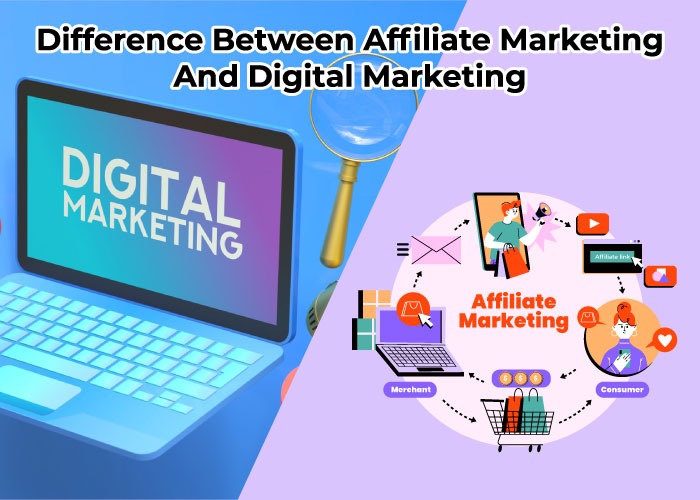In the dynamic landscape of online commerce, navigating the multitude of marketing strategies and channels can be daunting. Two commonly discussed methodologies are digital marketing and affiliate marketing, each with its distinct approach and objectives. Understanding the fundamental differences between these two strategies is crucial for businesses and marketers alike to devise effective marketing plans. In this article, we will explore the nuances of digital marketing and affiliate marketing, dissecting their strategies, purposes, and outcomes to shed light on which approach may best suit your business needs. By delving into the unique characteristics of each, we aim to provide clarity on how they differ and how they can complement each other within a comprehensive marketing strategy. We will talk about “Understanding the Nuances: The concept of Affiliate Marketing vs. Digital Marketing.”
What is Digital Marketing
Digital marketing is a broad term that encompasses all marketing efforts delivered through digital channels to reach and engage with a target audience. It involves leveraging various online platforms, technologies, and strategies to promote products, services, or brands and achieve specific marketing objectives.
Digital marketing utilizes the internet and electronic devices such as computers, smartphones, tablets, and other digital mediums to connect with consumers.
Key Aspects:
Channels: Digital marketing operates across platforms such as websites, social media, search engines, email, and more.
Objectives: It aims to achieve diverse marketing goals, including brand awareness, lead generation, customer acquisition, and revenue growth.
Tools and Tactics:
SEO (Search Engine Optimization): Optimizing websites and content to increase organic traffic and conversions.
Content Marketing: Providing valuable content to build relationships, establish authority, and deliver value.
Social Media Marketing: Utilizing platforms like Facebook, Pinterest, and Instagram to grow brand presence and engage audiences.
PPC (Pay-Per-Click): Promoting content through paid ads on platforms like Facebook or Google Ads.
Email Marketing: Engaging audiences directly through email campaigns.
Evolution: Digital marketing has evolved significantly since the 1990s, with Google’s entry in 1998 and the rise of social networking platforms in the early 2000s. Today, it permeates nearly every aspect of the internet.
What is Affiliate Marketing

Affiliate marketing is a subset of digital marketing that focuses on performance-based campaigns. It involves external partners (affiliates) who promote products or services to their audience.
Key Aspects:
Channels: Affiliates use platforms like blogs, social media, or websites to drive sales or actions.
Commissions: Affiliates earn commissions based on successful referrals or conversions.
Example: Imagine a lifestyle blogger promoting a fitness product through an affiliate link. When a reader clicks the link and makes a purchase, the blogger receives a commission.
Relationships: Affiliate marketing relies on partnerships between product owners (sellers) and affiliates.
Evolution: Affiliate marketing has been around for decades but gained prominence with the internet’s growth. It’s beginner-friendly and allows individuals to monetize their online presence.
What Is The Difference Between Affiliate Marketing and Digital Marketing

Conducting Parties:
In digital marketing, the seller or product owner directly executes marketing activities. They control the entire process, from strategy development to implementation. It’s good to talk about “The concept of Affiliate Marketing vs. Digital Marketing”.
In contrast, affiliate marketing involves a third-party affiliate marketer who promotes products on behalf of the seller or product owner. The affiliate marketer earns a commission for each sale or action generated through their promotional efforts.
Components Involved:
Digital marketing typically involves three primary components: the product or service being marketed, the digital channel used for promotion (e.g., website, social media, email), and the customer or target audience.
On the other hand, affiliate marketing involves the product or service, the affiliate marketer who promotes it, and the digital marketing platform or network through which the promotion occurs.
Objectives and Focus:
Digital marketing campaigns aim to increase website traffic, enhance brand awareness, and ultimately drive sales or conversions. The focus is on building brand recognition and attracting potential customers to the seller’s website or digital platforms.
In contrast, affiliate marketing primarily focuses on generating sales and earning commissions. Affiliate marketers leverage various digital marketing strategies to promote products and drive traffic to the seller’s website or landing page, aiming to generate revenue through successful conversions.
Scope and Strategy:
Digital marketing encompasses a wide range of activities, including market research, advertising, sales, analytics, and optimization. It requires a comprehensive understanding of various components such as search engine optimization (SEO), social media marketing (SMM), pay-per-click (PPC) advertising, email marketing, and content marketing.
Conversely, affiliate marketing primarily revolves around maximizing product exposure in targeted markets. Affiliate marketers employ strategies such as content marketing, influencer partnerships, affiliate networks, and search engine optimization (SEO) to promote products and drive conversions.
Execution and Incentive:
Digital marketing involves executing tasks related to research, advertising, sales, analytics, and refinement to achieve marketing objectives. The success of digital marketing campaigns is typically measured based on metrics such as website traffic, engagement, leads, and conversions.
In affiliate marketing, individuals promote goods and services in exchange for a monetary incentive, usually in the form of commissions. The focus is on driving sales and conversions through promotional efforts, with affiliates earning a commission for each successful referral or sale.
Sum Up
In summary, while digital marketing and affiliate marketing both involve leveraging digital channels to promote products and services online, they differ in terms of execution, objectives, focus, and incentives. Understanding these distinctions is essential for businesses to develop effective marketing strategies tailored to their goals and target audience.

